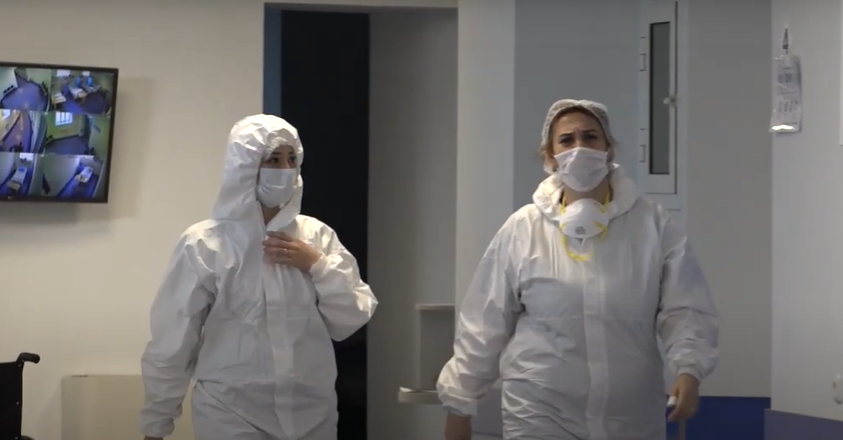Armenia has extended the state of emergency put in place over the coronavirus pandemic for a fifth consecutive time.
Announcing the extension during Wednesday’s government session, Prime Minister Nikol Pashinyan said he hoped it would be for the last time. Unless extended again, the state of emergency, which has been in place since 16 March, will be lifted at 17:00 on 12 September.
Pashinyan also said that the country might be able to resist a second wave of the virus in the autumn if all safety measures were followed. ‘But this can only happen if we learn to live with the virus,’ the prime minister said. ‘And this means only one thing — we have to strictly wear masks.’
‘We went through hell,’ Pashinyan said. ‘We have a chance to radically solve this problem.’
With this new extension certain restrictions will be lifted. Non-Armenian citizens will now be allowed to enter the country but will have to self-isolate for 14 days upon their arrival.
Protests and strikes will be allowed with certain conditions, such as obtaining official permission, wearing masks, and maintaining social distancing at 1.5 metres apart. Family and entertainment events and ceremonies, such as weddings and baptisms, will also be allowed to take place with a maximum of 40 participants. Libraries and museums will reopen, while theaters and concerts can only take place outdoors.
The government’s ability to impose restrictions on the movement of goods across borders will also be lifted.
Armenia’s Ministry of Education, Science, Culture, and Sports announced on 10 August that primary and middle schools, as well as classes at musical and fine arts schools will recommence starting 15 September instead of the traditional 1 September date. The ministry said safety regulations would be put in place though they did not give details.
The Ministry has said that decisions on how classes will be conducted in high schools and universities will be announced in the following week.
Opposition groups have expressed concern over the extension of the state of emergency.
During Wednesday’s parliamentary session approving the government’s decision, Edmon Marukyan, head of the opposition Bright Armenia faction stated that his party would propose a bill to lift the state of emergency.
He said that the necessary restrictions could still be imposed through other laws.
Reopening the economy
Armenia’s government had stressed the importance of reopening the economy forewarning of dire consequences if they did not. They have instead called on the public to maintain social distancing and hygiene measures.
In a meeting with President Armen Sarkisian on 11 August, Pashinyan stated that in April, the country had lost 70,000 jobs due to the coronavirus but that 50,000 of these had been restored in June.
According to Pashinyan, as of July, the number of jobs in the country is slightly higher than in July 2019.
Pashinyan argued that recent decreases in numbers of new cases were mainly due to mandatory face masks in outdoor and indoor public spaces.
The government believes the recent flattening of the curve is the country’s chance to overcome the virus, albeit, slowly. Pashinyan has made several calls for caution, however. ‘We have to strictly follow all safety measures if we want to have a chance to win the virus,’ he said.
Flattening the curve
The coronavirus pandemic has hit Armenia the hardest in the region, with almost 41,000 confirmed cases and 806 deaths attributed to the virus as of 12 August.
After the first case was confirmed on 1 March, Armenia’s coronavirus numbers spiralled in the following months peaking at the beginning of July.
Since the outbreak began, the government has launched 24 anti-crisis packages. Through these packages, around ֏100 billion ($208 million) from the banking system and the state budget were allocated towards different social and economic programmes.
Despite the increase of confirmed cases, Armenia’s government was criticised when it decided to lift certain restrictions that many believed to be too soon.
Throughout the month of May, cafes and restaurants, beauty salons, shopping centres, and kindergartens were allowed to reopen with safety regulations put in place. The manufacturing, construction, and communication sectors were also reopened, and restrictions on public transportation were lifted.
However, strict rules on wearing masks in all outdoor and indoor spaces were also imposed on 25 May, which remains in place. A fine of ֏10,000 ($21) for not wearing a mask was imposed.
Armenia’s government also invested in the production of its own COVID-19 tests. In March, the Institute of Molecular Biology started developing these tests and started production in June.
The government has allocated $250,000 worth of material for the production of 100,000 tests. As of today, the Institute has been producing 2,000 tests daily and so far has produced 47,000 tests. According to the Institute of Molecular Biology, the tests have a 98% accuracy rate.
Armenia has recently seen a decrease in the number of confirmed cases and an increase of recoveries. On Wednesday, the number of active cases dropped below 7,000 for the first time since mid-May.
According to Minister of Health Arsen Torosyan, the number of critical or extremely critical patients has also started to decrease. ‘Recently, their [the critical patients] numbers have remained steady — around 300 patients,’ Torosyan said during Wednesday’s government session. ‘This is also due to the fact that patients in the ICU tend to require longer treatment.’
The number of hospitals restructured to serve only coronavirus patients has also gone down from 20 to 15. According to Torosyan, two more hospitals will stop serving coronavirus patients in the next few days as well.
However, the number of deaths has not seen the same decrease.




 13 August 2020
13 August 2020



